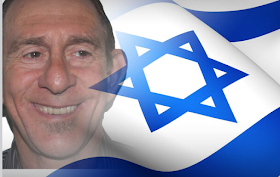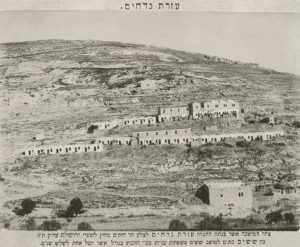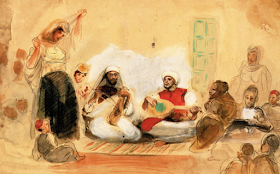Quds Day is held on the last Friday of the Muslim month of Ramadan, which this year fell out on May 31.
“Every year, Sayed Hussain Mazari pays street boys in Kabul to hold a rally celebrating Quds Day,” said Yousufi. Few religious centers in Afghanistan are self-financed or locally funded. Similar to other Middle Eastern countries such as Iraq, Lebanon, Yemen, Bahrain and Pakistan, many of the Shiite scholars in Afghanistan are bankrolled by Iran.
Yousufi claims that Mazari is among them, though he believes the latter will not publicly acknowledge this. The Islamic Republic of Iran, whose government is outspokenly anti-Israel, also maintains an intelligence presence in Afghanistan and supports groups here that serve its national interests.
Some experts believe Iran might be behind the spread of anti-Semitism within its neighbor to the east as part of an effort to build a united front against the Jewish state. Can it be anti-Semitic if there are no Jews?
“[The phrase] ‘Death to Israel’ is decidedly anti-Semitic,” said Prof.Shana Sippy, who teaches religious studies at Centre College, a private liberal arts school in Danville, Kentucky. “But there is also a lot of criticism of the Israeli government which isn’t anti-Semitic, and that is part of the challenge.”
Scholars have long researched sources of anti-Semitism, and have reached a degree of consensus on where it stems from in European countries such as Germany. But in Afghanistan, which is dominated by Islamists and bereft of a Jewish community, understanding anti-Semitism has become something of a challenge. There is currently only one known Jew living in the country.
Zebulun Simantov, the last Jew in Afghanistan
“It is puzzling, and scholars have been debating sources of Jew-hatred in countries such as Afghanistan, where it is very unlikely that this [hatred] comes from any experience with Jewish people,” said Dr. Gunther Jikeli, a visiting Jewish studies professor at Indiana University whose research focuses on anti-Semitism.
“[Moshe Dayan Center senior research fellow] Esther Webman says that Pan-Arab Nationalism and radical Islamist teachings have nurtured not only a hate against Israel, but also against Jews,” Jikeli said. Jikeli says Jew-hatred in Afghanistan may also be a residual effect of propaganda efforts by Nazi Germany during World War II, which included radio programs the regime broadcast to Arabic-speaking countries demonizing Jews.
Nearly 80 years after the Holocaust, Adolf Hitler still enjoys widespread popularity in Afghanistan, and his image is sometimes used in advertisements — including for a public speaking course which touts him as a model orator.
A common Afghan expression says that Hitler left some Jews alive to remind the world just how noxious they are. “There is also a debate on anti-Jewish elements in Islamic traditions,” Jikeli said.
“For example, [Canadian-Pakistani journalist] Tarek Fatah or [political scientist and professor] Bassam Tibi argue that Islamists misinterpret Islam and endorse anti-Semitic rhetoric.” In private conversation, Afghan religious hardliners compare terrorists with Jews, saying that “even” Jewish people are better than terrorists. And in political spheres, non-Pashtun ethnic groups hypothesize that the Pashtun, Afghanistan’s largest demographic, were originally Jews.
Dr. Davood Moradian, director of the Afghan Institute for Strategic Studies, rejects the hypothesis that the Pashtun were once Jews, saying that the theory was developed with a political agenda. While the Pashtun may not descend from Jews, there indeed once flourished a large Jewish community in the central Asian country.
In 2013, researchers discovered rare medieval Jewish documents dating from the 11th to 13th centuries in the caves of Afghanistan’s central Bamyan province. At its peak, the country’s Jewish community is estimated to have been as many as 40,000 strong, though they gradually emigrated over the years. Israel’s creation in 1948 drew most of the Jews that remained. In the 1960s, Afghan Jews left the country en masse, resettling in New York and Tel Aviv after living for centuries in peace and harmony with their Muslim neighbors.
Read article in full






















